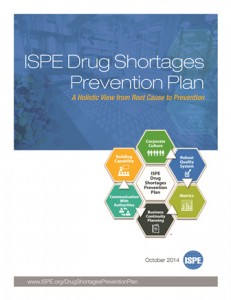Drug Shortages Prevention Plan Released
 ISPE released its Drug Shortages Prevention Plan yesterday during 2014 Annual Meeting in Las Vegas, Nevada.
ISPE released its Drug Shortages Prevention Plan yesterday during 2014 Annual Meeting in Las Vegas, Nevada.
Regulators from the European Medicines Agency (EMA), the US Food and Drug Administration (FDA), and the Medicines and Healthcare Products Regulatory Agency (MHRA), welcomed the Plan and spoke about the importance of the industry approach. ISPE developed the Plan in response to global regulatory interest in preventing drug shortages due to manufacturing and quality issues. A world first, presenting a global and holistic response uniquely addressing shortages at both the product and process levels, the Plan lays out how industry can best prevent drug shortages from occurring by identifying the root causes of supply disruptions and creating a quality culture that will ensure a robust, resilient and reliable supply of medications – some life-saving – to patients worldwide.
“ISPE’s Drug Shortages Prevention Plan is part of a significant and continuing effort since 2011 to ensure a safe, quality and reliable drug supply,” said ISPE President and CEO John Bournas at the Plan’s release in a special session. “We owe patients a sense of security by meeting their expectations for a reliable and continuous supply of the medications that are so important to them and their families. When members of the pharmaceutical industry discover and put to work the valuable insights included in the Plan, particularly those promising to strengthen the integrity of the supply chain and those describing how to place a greater emphasis on end-to-end quality, a real difference can be made in the lives of patients.”
ISPE shares the sense of urgency expressed by regulators, pharmacy groups and patients and commits to publicizing and making this work widely available. Accordingly, ISPE is providing the Drug Shortages Prevention Plan as a freely downloadable PDF on its website. The complete ISPE Drug Shortages Prevention Plan is available at: www.ispe.org/DrugShortagesPreventionPlan
The newly developed Drug Shortages Prevention Plan builds on the results of ISPE’s 2013 Drug Shortages Survey that cited manufacturing quality issues as a major cause of drug shortages. The Plan is global in nature and represents a continuum of work done to date supporting the EMA, FDA, and ongoing communications with other health authorities, such as Health Canada and Japan’s Pharmaceuticals and Medical Devices Agency (PMDA). “In 2012, a drug shortage crisis developed in many parts of the world, including the US,” said Donna Gulbinski, Senior Vice President Global Quality and Environmental Health at Bristol-Meyers Squibb and member of the ISPE Drug Shortages Task Team.
“We knew that quality manufacturing issues were a root cause, but drilling down farther we found other elements, such as equipment, raw materials and facility manufacturing problems. The Plan recommends that firms build a corporate goal around product quality and make building a Corporate Quality Culture the responsibility of everyone, from the CEO to the shop floor.”
In creating the Plan, the Task Team engaged with leadership from more than 30 major pharmaceutical companies and included input from experts from several pharmaceutical associations, including the Association of the European Self-Medication Industry (AESGP), the European Federation of Pharmaceutical Industries and Associations (EFPIA), the European Generic Medicines Association (EGA), the Parenteral Drug Association (PDA), and the Plasma Protein Therapeutics Association (PPTA). “Congratulations to ISPE,” said Douglas Throckmorton, MD, Deputy Directory, Regulatory Programs, FDA/CDER.
“Cooperation between industry and regulators is essential to preventing shortages before they occur, and the Plan highlights the value of cooperation for us to continue making progress in preventing drug shortages.” Brendon Cuddy, Scientific Administrator, European Medicines Agency, also reviewed the plan.
“I want to thank the ISPE team for their hard work in response to a challenge EMA laid down last year,” said Cuddy. “There are a plethora of reasons behind drug shortages. The supply chain is complex and we know that at every stage there is an opportunity for a problem to arise.” The Plan, said Cuddy, may make it possible to shift from being reactive to proactive and prevent drug shortages before they occur. “The Plan uses the word “resilience,” and that is a good word to describe a key aspect of what we are trying to achieve,” explained Cuddy. “It means being able to withstand the shock, but it also refers to the ability to bounce back.”
ISPE organized the Plan around a “six dimension” framework comprised of: Corporate Quality Culture; Robust Quality System; Metrics; Business Continuity Planning; Communication with Authorities; and Building Capability. In each chapter, the Plan provides answers to questions posed within each of the six dimensions, and also offers “real world” case studies that illustrate successful strategies to avoid supply disruptions and shortages.